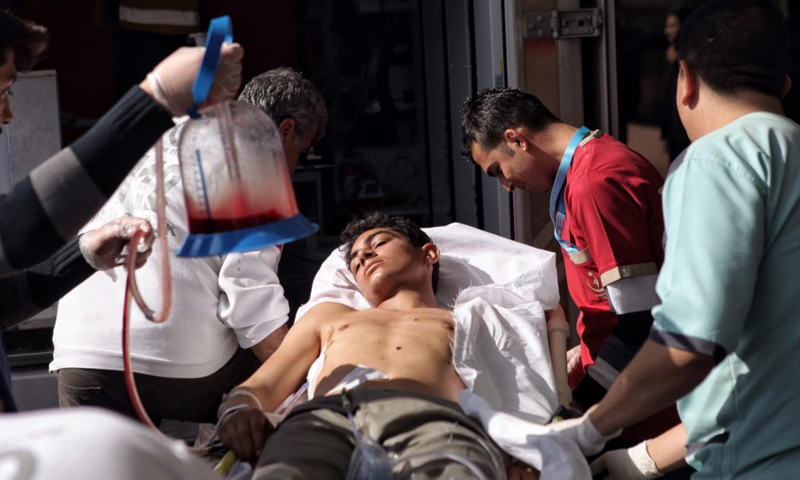
"Did you bring him over to die in here?"
Hospitals in Syria…A lost humanity and extra death

Printed Edition ‖ No.: 221
The Syrian Governmental hospitals were never an example of medical or hygiene care before the revolution, which pushed most Syrians to head to private hospitals “for fear of their lives”, spending for that all that is expensive and precious.
However, the poor security and living conditions in light of the war contributed to diminishing the difference between the private and government hospitals for the worse; which actually made them both “a real example” of what health centers should not be like; and what made things worse was the almost complete absence of scrutiny, the devaluation of the Syrian pound and the immigration of large numbers of doctors and people of experience in the field.
A defect in the cardiac valve!
“My father died suddenly, due to a cardiac valve that is not working”, with this statement Sara, a graduate from the city of Hama, sums up the sudden tragedy that befell her family due to a medical mistake.
Sara’s father is 63 years old, suffering from a heart problem for twenty years, but recently his health began to get worse, “to the point where he fainted as he was going up the stairs. We rushed him to the hospital and they told us after the catheter that he needs a cardiac valve replacement”, as Sara adds.
The family insisted on having the operation in a private hospital in Damascus, as, according to Sara; “the hospitals in Damascus are more advanced and there is a larger scale of health scrutiny in there. My mom sold her jewelry in order to cover the treatment costs, my father was transferred to a private hospital in Damascus and the doctors performed the operation on him.”
After doctors finished the operation, they were shocked to see the patient’s pulse slowing down announcing a disorder; they found out that there is a problem with the valve they have just installed, as it is not working properly, “the doctors told us that they have tried to control and fix the mistake and change the valve at once, but my father died in their hands in the meantime.”
We have asked Sara whether they have filed a complaint against the doctor or the hospital, she shook her head negating; “we have asked a lawyer who told us that taking the summons to the court will cost us a lot with no guaranteed results, especially that my father was sick and the hospital has tests to prove that”, she continues with a sigh “we resorted to Allah, as nothing will bring my father back to us.”
Death due to the need of a blood bag
In an interview with Dr. Hakim, an anonymity doctor (for security reasons) in Damascus, he asserts that he advise his patients to go to governmental hospitals, despite all the negligence and laxity in there, justifying that; “I advise them to go to governmental hospitals for one reason; the availability of blood bags when needed, something that private hospitals lack, despite all their equipment.”
Hakim testifies to what he said with a story from the Mahaini hospital in Damascus; “a lady died during a caesarean section, under effect of severe bleeding, which doctors were unable to stop or compensate due to the absence of blood bags in the hospital.”
“Trade is cleverness”
Hakim adds that the medical situation has become confusing nowadays. It is very hard to decisively direct his patients, as each choice has its own consequences, he explains; “the government hospitals are controlled by middlemen, not to mention the lack of the simplest criteria of hygiene and sterilization, in addition to the need to wait, which is something that a patient’s condition does not allow at many times.”
He resumes that private hospitals are no better, “regardless of the repeated deadly medical mistakes, that are passing by with no consequences due to the slackness of scrutiny as a result of the bad security situation; the costs of treatment at private hospitals have become dramatically pricy and beyond most of Syrians’ financial capacity nowadays, for example, the cost of childbirth at some private hospitals is 200 thousand Syrian pound, and the price might rise according to the type of childbirth (Caesarean or normal), the hospital’s name, the doctor and the period of stay, let alone the costs of major surgeries and incurable diseases such as cancer?”
Um Bilal’s experience (35 years old from Damascus) confirms what Dr. Hakim said, as she says; “my husband was rescued from his work to AlShami Hospital due to a heart attack. I rushed to the hospital to inquire about his situation after his colleagues at work informed me. The doctor started saying: do you want us to perform an operation that costs 600 thousand Syrian pounds or just get him on 75 thousand Syrian pounds worth medication.”
Um Bilal adds “can you imagine that the doctor said that to me before I could even see my husband or understand what his condition is? Since when the doctor work as an accountant?”
Cockroaches… Spider’s web…and a moist wall!
This was what Ghyath (23 years old from Homs) saw in Al-Ameen Hospital upon visiting his grandfather, he explains; “I went up to the kitchen to ask the nurse to heat up the food for my grandfather, but I was shocked to find her sleeping amid unspeakable filth.”
Ghyath describes the scene as “a random neighborhood neglected of cleanliness and civilization”, adding; “how could the kitchen where patients’ food is prepared to look like this, small cockroaches are running everywhere, a spider’s web stands in the corner and a wall was peeling due to humidity, how is this supposed to be a kitchen, not to mention being a kitchen in a hospital?”
Ghyath adds “if a patient does not die of disease, he would die after eating food cooked in a kitchen like this. It seems like hospitals’ mission these days is postponing death for a few days rather than healing disease.”
An urgent appendix operation
At AlMowasa Hospital, in the waiting line, Amal, a 25 years old engineer, waited with her sick sister Mona to meet the doctor. But the line was not moving; “of course there are two lines; a military and a civilian, the military line was moving fast, while the civilians’ line was slow ruled by bribes and middlemen”, as the girl puts it.
Amal stepped up to meet the doctor, hoping that the doctor will take into consideration her sister’s bad condition and will examine her quickly, “unfortunately, the doctor looked with disdain at my hijab, and said to me in her clear affiliation dialect to step back into line like everyone else.”
Amal could not stay patient watching her sister’s bad condition and her increasing abdominal pains, so she took her to Al-Razi Hospital “there they transferred her to operation room immediately, as they found out she needs an appendix operation before it exploded.”
Amal says; “I thank Allah that I did not wait, as the price might have been the life of my sister, despite the simplicity of an operation like this these days”, adding sorrowfully; “I was able to go to Al-Razi Hospital, but are all patients capable of heading there and pay its high prices?”
A death during an appendectomy
It seems that Amal was right in what she said, since a “simple” appendectomy operation, as she says, was the reason behind the death of a young 20-years-old girl; who is a graduate of the Faculty of Engineering of the University of Al-Baath.
Abdel Rahman, an English Literature student at the University of Al-Baath, tells us about this story, saying; “all of a sudden, we heard about the death of a young engineer in our neighborhood; she used to have excellent health and never seemed to show any symptoms of illness, in addition to attending to her job daily before her death, which made it very strange for us when we learnt of her death.”
Investigating the causes of her death, Abdul Rahman found out that death happened during an appendectomy operation “the family rushed their daughter to the government hospital, and they had to wait, but she died during the operation due to the appendicitis explosion. This is what we learnt about.”
Did you bring him here to die?
Saeed, from Homs, tells us about the attempt to rescue his father the night he died. A story that will probably sums up all that was mentioned in the report; “my father, may Allah have mercy on him, had a colon cancer; the night he passed away, his condition got very bad and suffered from shortness of breath. We called the ambulance and the Crescent van came and picked us up, however, the van did not know where to take us, the driver called all of Homs’ hospitals; Hilal, Ar-Razi, An-Nour, Al-Ameen, Al-Watani and Al-Zaim, but they all declined due to the lack of empty spots at their hospitals. Eventually, Bisan Hospital received us in the camp, because we had a friend whose brother works there as a doctor, and only after I signed an undertaking upon my own responsibility of committing my father in there.”
Said says that once they arrived at the hospital, one of the nurses started yelling at the family, saying; “did you bring him over to die in here?”
Said’s father passed away that night. Upon investigating, Said found out that each of Al-Hilal, Al-Ameen and An-Nour actually had empty spots and doctors on call, but they simply did not feel like receiving short-breath cases “because they feared that he was infected with swine flu or pneumonia, and so did not want to receive such dangerous cases.”
if you think the article contain wrong information or you have additional details Send Correction
النسخة العربية من المقال
-
Follow us :
Most viewed
- Negotiations between SDF and Damascus: Agreement on generalities, disagreement on details
- Suspension of EU sanctions: Limited impact fails to meet recovery needs in Syria
- Challenges paralyzing electricity sector in Syria
- Peace under pressure or division... What are Israel's plans and tools in Syria
- Israel threatens Damascus via Jaramana

















 A
A
A
A
A
A
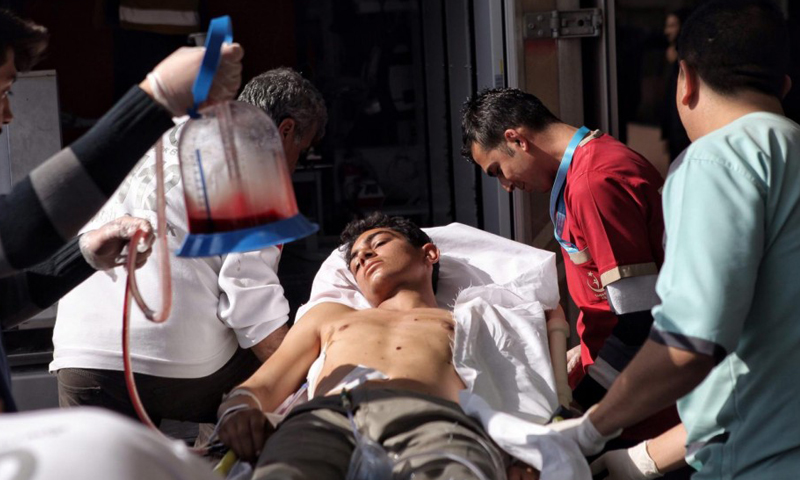



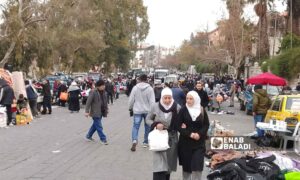

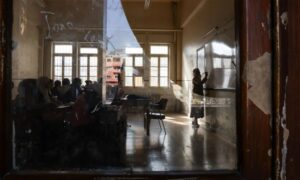
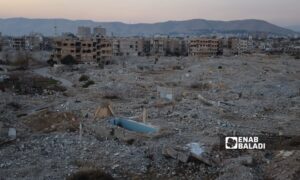
 More Society
More Society